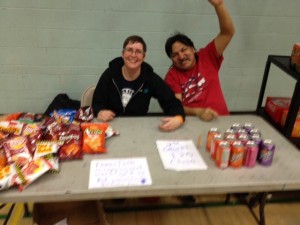Looking at a map of Manitoba I recall the places I have worked as a youth health educator over the past 15 years – places like God’s Lake Narrows, Nisichawayasihk Cree Nation, St. Theresa Point, Pine Creek, Peguis, Mathias Colomb, Norway House, Leaf Rapids, The Pas/OCN, Flin Flon, Grand Rapids, Thompson… I’m close to my 50th trip and while I still feel like I’m just getting started there is much to reflect on – the communities and people I have met, the practice knowledge I have gained, who I am in this work and how much I still need to learn and reimagine.
In my eyes, Teen Talk is social justice work that envisions a world where youth regardless of location have access to nonjudgmental information and support in the areas of mental health, sexual health, and healthy relationships. We recognize the large disparities in our province and see our potential to create ongoing positive change. Not unlike my ten coworkers, I am very committed and passionate about this work for my own reasons. I am a Swiss newcomer who grew up on a family farm in the Interlake where I learned from living on the land, being an outsider, and having limited resources and choices. This has given me a unique lens to do this work beyond the perimeter of Winnipeg.
When Teen Talk leaves the city, the work looks very different. Preparing for a trip involves getting to know a community by talking to the contact and what local resources exist for youth, scanning news sites and connecting with local Teen Talk trained service providers. It also includes looking into the community’s history, the traditional territory and the treaty number. For places with very little resources we pack extra food, little gifts and extra treats. Treats often come in the form of granola bars and cheese, as well as candy. When flying we’re usually up at the crack of dawn catching the first flight, lugging our boxes of condoms and resources hoping our smile will allow the extra few pounds of luggage to be overlooked.
Once we touch down, we’re often welcomed by a smiling face and a truck that in spite of many rough roads still keeps going, much like its driver. “Thank you for coming,” is what I hear most often; a testament to how little resources do filter into communities.

Myself and Emile, a guidance counselor, selling treats at a wrestling event at St. Theresa Point High School in St. Theresa Point.
We are now on someone else’s land and things are done differently. Each community has its own culture even within farming, mining, and Metis communities and the same Indigenous Nations. The common thread is that in all instances we are the outsiders and thus we must enter into relationship. There must be trust. In community much is still relational and people are dependent on each other. We have learned the importance of staying more than a day, offering to lend a hand and getting involved in community events to help build rapport. Teasing and hanging around are often signs of acceptance. The information is often appreciated or met with curiosity. Of course, “condom play” and “genital salad” are a hit as there aren’t many who don’t like yelling anus, penis, vagina, nipples!
However, it’s not all fun and games. Laughter is sometimes used to cover pain. Often on breaks or in the truck we’ll hear a story of the loss, pain, or trauma that people are dealing with. That’s the time we listen, acknowledge and validate. Life can be very hard, isolating, and resources are scarce.
The work is rewarding and also raises many questions. As a provincial program, I hope we continue to ask ourselves the hard questions: Who are we in this work? What does allyship and a more just world look like? How can we be more relevant? How can we better meet the needs of many diverse communities? How can we advocate for more equitable resources beyond the perimeter? Yes, being a youth health education program with a provincial mandate is no small task.
Eveline, Youth Health Educator
Northern Service Provider Program
Teen Talk – Klinic Community Health

